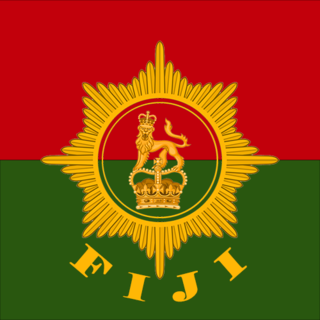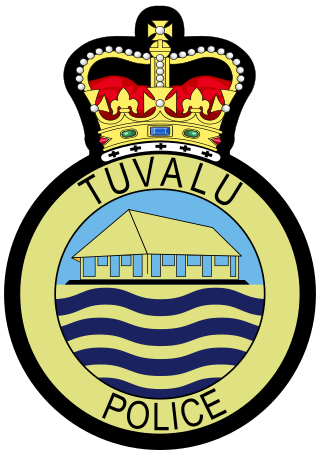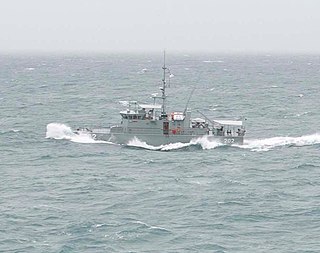
The Republic of Fiji Military Forces is the military force of the Pacific island nation of Fiji. With a total manpower of about 6,500 active soldiers and approximately 6,200 reservists, it is one of the smallest militaries in the world and the third largest in the South Pacific region. The Ground Force is organised into six infantry and one engineer battalions.

The Pacific class is a class of 22 patrol boats built by Australia and donated to twelve South Pacific countries. They were constructed between 1985 and 1997 and are operated by militaries, coast guards or police forces of twelve island nations. These boats are supported by the Pacific Patrol Boat Program and used primarily for maritime surveillance and fisheries protection.

The Tuvalu Police Force is the national Police force of Tuvalu, it is headquartered in Funafuti and includes a Maritime Surveillance Unit, Customs, Prisons and Immigration. Police officers wear British style uniforms.

The Australian Marine Complex (AMC) is a marine industry precinct located at Henderson, Western Australia, 23km south of the Perth CBD. It is located on Cockburn Sound.
Security in the South Pacific has proved to be one of the most enduring of Australia's security concerns. It was the subject of Australia's first substantial strategic policy initiative, when in 1888 Alfred Deakin took his concerns about French intrusion into Vanuatu to London. Since then, the South Pacific has played an important role in Australian security thinking. Notably during the Second World War in the Pacific and through Australia's responsibilities as a colonial power in Papua New Guinea until that country's independence in 1975. Australia was regarded as having been quite detached from the Pacific Islands during the post colonial period. However this period, until the beginning of the 21st century, was marked by numerous small scale Australian Defence Force (ADF) operations in the region. The notable cases were in Vanuatu in 1980 and 1988 as well Fiji in 1987. The ADF also played an important role in peacekeeping missions in Bougainville during this period.

Australia–Federated States of Micronesia relations are the bilateral relations between Australia and Federated States of Micronesia (FSM). Australia was the first country to start diplomatic relations with FSM in 1987 and is one of the four countries that have resident ambassadors to Micronesia. The two countries are members of the Pacific Islands Forum.

The Guardian-class patrol boats are a class of small patrol vessels designed and built in Australia and provided to small South Pacific Ocean countries as part of the Australian Government's Pacific Maritime Security Program.
The Pacific Islands Forum's Forum Fisheries Agency maintains a Regional Fisheries Surveillance Centre in Honiara, Solomon Islands. In 1982, the United Nations Convention on the Law of the Sea gave all maritime nations, including the smaller Pacific Ocean nations, 200-nautical miles Exclusive Economic Zones (EEZ). Monitoring their EEZs is a challenge for some of the smaller nations, where their maritime zones dwarf their landmass, making cooperation essential.

HMPNGS Ted Diro (P401) is the first Guardian-class patrol boat to be completed. Australia designed and provided four Pacific Forum-class patrol vessels to Papua New Guinea in 1987 and 1988, and in 2015 confirmed she would be replacing those vessels with four larger, and more capable, Guardian-class vessels.

RMIS Lomor (03) is a Pacific Forum-class patrol boat operated by the Republic of Marshall Islands Sea Patrol. Lomor is one of twenty-two small patrol vessels Australia designed and built for smaller fellow members of the Pacific Forum, after the United Nations Convention on the Law of the Sea extended control of a 200-kilometre (108 nmi) exclusive economic zone for all maritime nations.

HMTSS Te Mataili II (802) is the second Guardian-class patrol boat completed, and the first to be given to the small Pacific Ocean nation Tuvalu. She was commissioned on 5 April 2019, replacing Te Mataili, a Pacific Forum patrol vessel, that had reached the end of her designed lifetime.

PSS Remeliik II is a Guardian-class patrol boat in the service of Palau's Division of Maritime Law Enforcement, built, and provided by Australia to replace the Pacific Forum patrol boat PSS Remeliik. In the late 1980s and early 1990s Australia helped its smaller neighbours, in the Pacific Forum by building small patrol boats so they could protect their own sovereignty. The United Nations Convention on the Law of the Sea (UNCLOS), had extended an exclusive economic zone (EEZ) 200 kilometres (120 mi) off the shores of all maritime nations, and for small Island nations in the Pacific protecting their EEZ would be an overwhelming problem.

RSIPV Gizo (05) is a Guardian-class patrol boat in service with the Royal Solomon Islands Police Force Maritime Department. She was the fifth boat of her class to be completed. Australian officials officially handed her over to representatives of the Solomon Islands on 8 November 2019, at the Austal shipyard in Henderson, Western Australia.

RKS Teanoai (301) is a Pacific Forum-class patrol boat operated by the Republic of Kiribati Police. Teanoai is one of twenty-two small patrol vessels Australia designed and built for smaller fellow members of the Pacific Forum, after the United Nations Convention on the Law of the Sea extended control of a 200-kilometre (108 nmi) exclusive economic zone for all maritime nations.

RFNS Savenaca (401) is a Guardian-class patrol boat, being built in Australia for Fiji's Navy. She will replace RFNS Kula, a Pacific Forum patrol vessel provided by Australia in 1994. She will be the seventh vessel of the class to be completed, and the second of two to be delivered to Fiji. She will be commissioned in March or April of 2020.

The Republic of Fiji Navy or Fijian Navy is the naval branch of the Republic of Fiji Military Forces. The Fijian Navy was established after Fiji ratified the recently created 1982 United Nations Convention on the Law of the Sea. The Convention established that maritime nations had an Exclusive Economic Zone of 200 kilometres, which extended Fiji's waters twentyfold, from 50,000 square miles (130,000 km2) to over 1,000,000 square miles (2,600,000 km2), necessitating a more substantial naval force to enforce Fijian jurisdiction and protect economic activity in the Fijian EEZ.

RKS Teanoai II (301) is a Guardian-class patrol boat in service with the Kiribati Maritime Police. She was given to the Republic of Kiribati by Australia as part of the Pacific Maritime Security Program, in which Australia donates patrol boats to neighbouring Pacific Island nations in order to improve regional maritime security. She was the eighth boat of her class when launched in April 2020, but became the eleventh to be delivered due to delays caused by the COVID-19 pandemic. She was officially handed over to the Kiribati police crew at the Austal shipyard in Henderson, Western Australia on 18 June 2021, replacing the 27-year-old Pacific-class patrol boat RKS Teanoai as the small island nation's sole maritime security craft.

RVS Takuare is a Guardian-class patrol boat in service with the Vanuatu Police Maritime Wing. She was given to Vanuatu by Australia as part of the Australian government's Pacific Maritime Security Program on 30 July 2021. Her predecessor, the RVS Tukoro, was the second vessel of the first iteration of the Pacific Patrol Boat Program, and served in the same role from 1987 to 2021. The Takuare is currently the only naval or law enforcement vessel operated by the Pacific Island nation.

FSS Independence is a Pacific-class patrol boat manufactured by Australia and delivered to the Federated States of Micronesia under the Pacific Patrol Boat Program. It was superseded in January 2022 by Guardian-class patrol boats under the Pacific Maritime Security Program.

Nafanua III (04) is a Guardian-class patrol boat entering service with the Samoan Police Force. She was given to Samoa by Australia as part of the Pacific Maritime Security Program, in which Australia donates patrol boats to neighbouring Pacific Island nations in order to improve regional maritime security. She is the 2nd boat given to Samoa under the program, as she was ordered by Australia on 2 November 2022 as a replacement for her sister ship Nafanua II, which was damaged beyond repair when she ran aground on 5 August 2021. Nafanua II had only two years earlier replaced the 31 year old Pacific-class patrol boat Nafanua as the small island nation's sole maritime security craft. Although she was ordered as the 22nd and ultimate boat of her class, she was delivered on 22 November 2023 as the 18th.
















